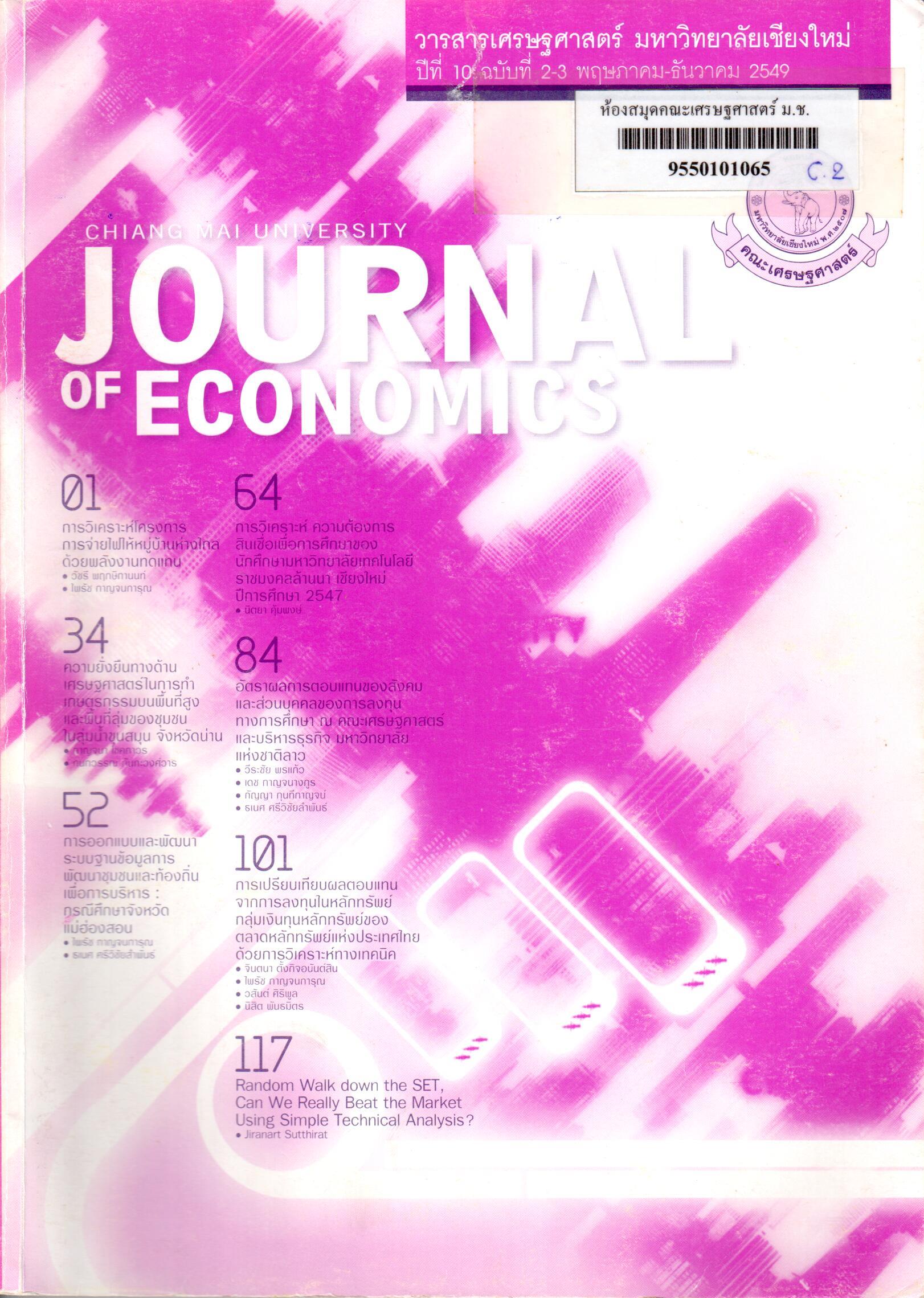ความเจริญเติบโตของผลิตภาพปัจจัยการผลิตและการมีส่วนร่วมของการศึกษาอาชีวศึกษาที่มีต่อความเจริญเติบโตของระบบเศรษฐกิจไทย
Abstract
บทคัดย่อ
การศึกษานี้มีวัตถุประสงค์ เพื่อศึกษาข้อมูลและลักษณะทั่วไป ระดับประสิทธิภาพทางเทคนิคและระดับความเจริญเติบโตของผลิตภาพปัจจัยการผลิตในการจัดการศึกษาระดับอาชีวศึกษา ซึ่งมีการประมาณค่าแบบไม่มีพารามิเตอร์ วิธีการวิเคราะห์แบบ Data Envelopment Analysis นอกจากนี้ ยังศึกษาถึงระดับการมีส่วนร่วมของการศึกษาอาชีวศึกษาที่มีผลต่อความเจริญเติบโตทางเศรษฐกิจของไทย ซึ่งใช้วิธีการวิเคราะห์ถดถอยพหุคูณ โดยข้อมูลลักษณะทั่วไปและการวัดระดับประสิทธิภาพทางเทคนิคนั้น ได้ใช้ข้อมูลประจำปีการศึกษา 2546 ซึ่งได้ส่งแบบสอบถามไปยังสถาบันอาชีวศึกษาทั่วประเทศจำนวน 132 สถาบัน
ผลการศึกษาเรื่องระดับประสิทธิภาพทางเทคนิคของสถาบันอาชีวศึกษาพบว่า สถาบันการศึกษาที่สังกัดในภาครัฐและเอกชน มีระดับประสิทธิภาพทางเทคนิคเฉลี่ยในการจัดการศึกษาไม่แตกต่างกัน และอยู่ในระดับค่อนข้างสูง โดยที่ในภาคเหนือนั้นมีเกณฑ์ต่ำกว่าภาคอื่นๆ ส่วนในเรื่องของระดับความเจริญเติบโตของผลิตภาพปัจจัยการผลิต พบว่า ทั้งในส่วนของภาคเอกชนและรัฐ มีดัชนีของอัตราการเจริญเติบโตของผลิตภาพปัจจัยการผลิตอยู่ในเกณฑ์ต่ำ แสดงให้เห็นว่าตั้งแต่อดีตจนถึงปัจจุบันยังไม่ให้ความสำคัญกับการพัฒนาด้านเทคโนโลยีและทางเทคนิคเท่าที่ควร
ผลการศึกษาบทบาทในการมีส่วนร่วมของการจัดการอาชีวศึกษาที่มีผลต่อความเติบโตทางเศรษฐกิจ พบว่า การจัดการศึกษาภาคอาชีวศึกษามีบทบาทต่อผลิตภัณฑ์มวลรวมในประเทศ ถึงแม้ว่าอัตราส่วนค่าใช้จ่ายของสถานศึกษาระดับอาชีวศึกษาภาครัฐทั้งหมดต่อมูลค่าผลิตภัณฑ์มวลรวมประชาชาติในปีที่ t จะไม่สามารถนำอธิบายความเติบโตทางเศรษฐกิจได้อย่างมีนัยสำคัญก็ตาม แต่อย่างไรก็ตาม ค่าของเครื่องหมายเป็นบวกซึ่งแสดงให้เห็นโดยนัยว่าตัวแปรดังกล่าวมีผลกระทบเชิงบวกต่อความเจริญเติบโตทางเศรษฐกิจ
Abstract
The objectives of these are to study general information and the nature, examine technical efficiency of vocational education management, and investigate the total factor productivity growth and to discern the contribution of vocational education to economic growth of the Thai economy. Data Envelopment Analysis (DEA), a non-parametric estimation technique was used to analyze the contribution to economic growth. Primary data of 2003 school year were obtained from questionnaires sent to 132 vocational school nationwide.
It was found there are existed no statistical difference in technical efficiency of vocational education management between public and private school sectors. In fact, the average technical efficiency was rather high, although these schools in the North part of Thailand had comparatively lower technical efficiency than their counterparts in other regions. The investigation on the total factor productivity growth of vocational education management revealed both private and public vocational schools had rather low growth rate, thus reflecting the inadequate attention that the vocational education system so far has paid to importance of technological development and technical efficiency.
Vocational education was found to contribute to economic growth of the Thai economy although the proportion of aggregate expenses of the Department of Vocational Education in the gross domestic product of year t could not explain the impact on economic growth statistically significant. However, the positive sign of coefficient implied that the vocational education had a contributing role in the growth of the Thai economy.
Downloads
Issue
Section
License
All opinions and contents in the CMJE are the responsibility of the author(s). Chiang Mai University Journal of Economics reserves the copyright for all published materials. Papers may not be reproduced in any form without the written permission from Chiang Mai University Journal of Economics.






